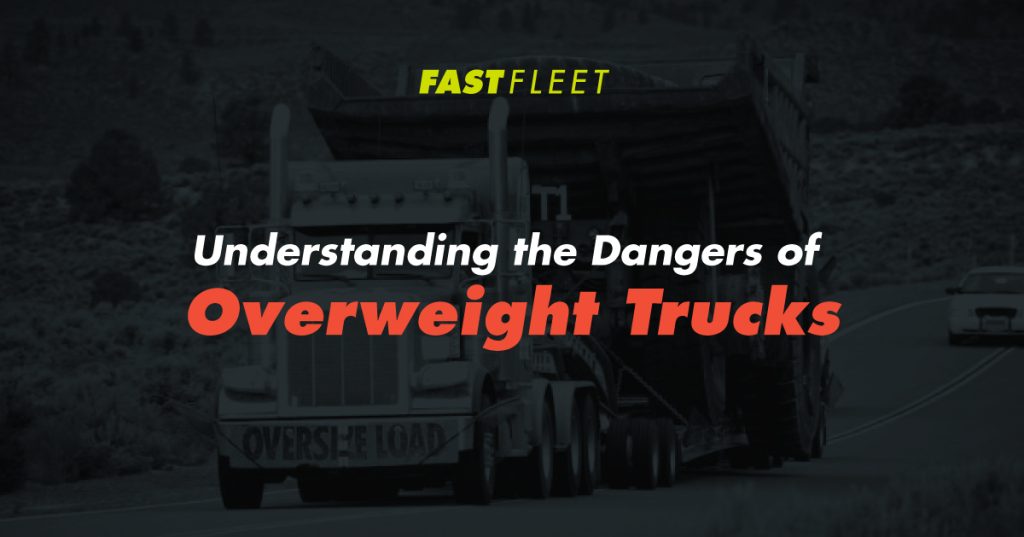The Department of Transportation in the United States wants to help to reduce the number of safety hazards on the roadways. In 2005, they introduced DOT inspections on commercial motor vehicles, which ensures that all the parts and components on the vehicle are in good cond
Semi-trucks and trailers keep America moving. To do that, they must carry heavy loads; sometimes too heavy. From produce to consumer goods to construction equipment and everything in between, trucks haul it all. Yet, it’s important to keep an eye on your truck’s weight, and it’s not just about avoiding overweight fees (which can be considerable).
Driving an overweight/overloaded truck presents several threats, including to other vehicles on the road, to the truck’s onboard systems, and even to the roadways and bridges it travels. What are those dangers? We’ll explore them below.
Are overweight trucks that big of a problem?
In a word, yes. According to experts, up to 30% of the semi-trucks and dump trucks on America’s roadways are overloaded, many of them dangerously so. That’s bad news for trucking companies and owner-operators, as well as for others who share the road with them (more than one in eight auto accidents involves a big rig today).
For trucking companies and owner-operators, driving with excess weight can mean extra costs and emergency repairs. It can also mean other things like traffic violations or being involved in a potentially fatal accident.
The risk of fines
First and foremost, running overweight means that you’re at risk of fines. The US is particularly stringent about truck/trailer weights, with the maximum weight of 80,000 lbs. unless you pay for an overweight certificate.
Fines vary by state, but none of them are cheap. For instance, Indiana’s DOT can fine you up to $10,000 for being 10,000 lbs. over maximum gross weight. Things are even stiffer if you’re a “repeat offender”.
However, as we mentioned at the beginning, the fines are just the start. You also need to consider other risks.
The risks to the road
America’s roadways are not in the best shape. While government investments in our infrastructure promise to alleviate that, those results are still far in the future at this point. Today, we must deal with crumbling roadways and bridges made dangerous by erosion, as well as normal wear and tear.
Every single vehicle on the road contributes to deterioration. However, semis and trailers do so far more than anything else. This is particularly true for oversized loads, but overweight loads also cause their fair share of issues. And the higher your tire pressure, the greater the pressure put on the roadway, leading to a host of issues, like cracking.
Overweight trucks put a great deal of stress on bridges as well. This applies to bridges of all types, but some are more susceptible including suspension bridges and those covering wide spans. Old bridges that have not been repaired/retrofitted are also in danger of serious damage and/or failure due to excessive loads.
The risks to other drivers
Every time a truck and trailer get on the road, it puts others at risk. Overloading your truck only increases the potential for damage and harm to others. For instance, consider the increased pressure that overloading causes to your tires. Even moderately worn tires may fail under overloaded conditions, potentially damaging nearby vehicles and causing an accident, as well as injuries. With every auto accident, there is also the chance for the loss of life.
Overloaded trucks are also more difficult to handle on the road. They move differently and can be very unstable, particularly during curves. It takes very little to make an overloaded truck begin tipping in a turn, ending in a rollover accident that puts the lives of multiple other people, plus the driver at risk. Tipping is also more likely in high winds, so even driving straightaways in those conditions can become much more dangerous.
The risks to your truck and trailer
Finally, we need to talk about the risks that overloading poses to your truck itself. We’ll break this down below.
• Brakes – overloaded semis take much more energy to stop. That puts immense wear and tear on your brake system and will shorten the life of your pads, rotors, shoes, and drums. Overheated brakes don’t stop as well, either, which exacerbates the problem with handling on the road, and leads to brake failure. Remember, it takes 50% more distance and time for a truck that weighs 120,000 lbs. to stop than a truck that weighs 80,000 lbs.
• Tires – we touched on tires previously, so we’ll add just a bit. Overpressure semi-tires can explode like bombs, causing damage to vehicles around the truck, as well as to the truck and trailer itself.
• Suspension wear – the suspension plays a central role in truck handling, as well as how the truck and trailer perform during operation. Overloading puts additional wear and tear on suspension components, reducing their lifespan. In some cases, this wear causes components to fail outright.
• Damage to trailers – weather, sunlight, and load stresses are just some of the factors that lead to trailer deterioration over time. The older a trailer, the more likely it is to suffer from structural degradation. Overloading a trailer can lead to failure as the load shifts, sending the load through the wall of the trailer itself. This is much more likely to occur with very old trailers, but enough wear and tear can compromise even newer ones.
• Additional engine and transmission wear – semi engines work hard to get heavy loads up to speed and then maintain that speed for long distances. The heavier the load, the harder the engine must work. Overloaded trucks put significant wear on engines and transmissions, meaning that you’re reducing the time required for major repairs or replacements and costing yourself a lot of money in the process.
The takeaway
Overloading trucks can seem like the only option, but it’s a risky proposition. In a best-case scenario, you’re putting your vehicles and drivers in danger of breaking down on the side of the road with a blown tire or failed brakes and having to wait for emergency help. At worst, it dramatically increases the chance the truck will be involved in a potentially life-threatening accident. Always adhere to weight restrictions – safety matters!
Resources:
https://www.hdinjurylaw.com/blog/dangers-overweight-trucks/#:~:text=Perhaps%20the%20greatest%20threat%20of,other%20motorists%20on%20the%20roadway.
https://activescale.com/overweight-truck-consequences/
https://www.quora.com/How-dangerous-can-it-be-for-a-trucker-s-load-to-be-overweight
https://trucksafety.org/overweight-trucks/#:~:text=As%20a%20result%2C%20as%20much,nation’s%20roads%20is%20well%2Ddocumented
















